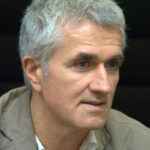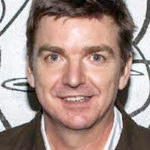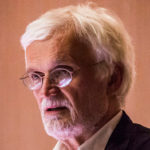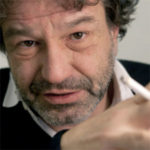Tuesday, 21 September 2021
All times are CEST
Special session: Designscapes and the New European Bauhaus
Speakers meeting link: https://bit.ly/36uVRwF | Meeting attendants: Facebook live at https://www.facebook.com/designscapesproject/
- 09:30-09:45 Welcome
Elena Conti, ANCI Toscana - 09:45-10:00 Introduction
Laura Hetel, European Commission, DG RTD - 10:00-10:30 Interpreting the New European Bauhaus
Grazia Concilio, DAStU, Politecnico di Milano
Nicola Morelli, Aalborg University - 10:30-10:45 Q&A
- 10:45-11:45 Panel discussion
Ezio Manzini (DESIS), About sustainability
Ken Friedman (Tongji University), About aesthetics
Guy Julier (Aalto University), About inclusiveness - 11:45-12:00 Q&A
- 12:00-12:30 Closing remarks
Florian Schneider, NTNU Trondheim - 12:30 End
Our speakers

Elena Conti is the Head of European Projects Department of Anci Toscana. She coordinates the activities aimed at the development and submission of projects on direct and indirect European funds. In this role, she deals with the analysis of the territorial contexts, of the related needs and opportunities, with the development of intervention strategies for the development of innovation processes, with the creation of local, national and international networks for the sharing of experiences and for the realisation of pilot actions. For the activities of the department it collaborates with a group of highly experienced professionals with whom, together with the Municipalities, important projects on a European scale have been carried out and are being carried out, ranging from European Territorial Cooperation (Interreg Europe, Med, Cross-border IFM), to ENI, Horizon, AMIF, FAMI, LIFE. She collaborates with the Institutional Strategic Board of the Association in defining municipalities negotiating positions vis-à-vis Tuscany Region relating to the programming of European and national resources and in this role is part of the Monitoring Committees of the POR. He follows directly on behalf of the Association the development of the Tuscany Strategy for Sustainability (Agenda 2030) and its implementation on the territory.

Laura Hetel is Policy Officer at the European Commission, DG Research & Innovation, Unit C2 Future urban and mobility systems. Recently she has been working on the setup of the mission on Climate Neutral and Smart Cities under Horizon Europe. She also dealt with the socio-economic impact of technologies and was steering the international cooperation activities in the area of urban and mobility systems. In her previous roles in the Commission, she worked on issues pertaining to governance, migration and culture. Laura holds a B.A. in political science and economics and a PhD on the interplay between consumerism and national identity from the Ohio State University, USA.

Grazia Concilio, Associate Professor at DAStU – Department of Architecture and Urban Studies of Politecnico di Milano – works on innovative processes in urban contexts, integrating urban planning, technological and digital innovation as a shared learning process. She has been scientific coordinator for POLIMI of the Periphèria, MyNeighborhood|MyCity (FP7), Open4Citizens, DESIGNSCAPES, Polivisu and MESOC (Horizon 2020 funded) projects and Coordinator of easyRights project also funded by the EU Horizon 2020 programme.

Nicola Morelli is Professor at Aalborg University in Denmark. He has previously worked at RMIT University, in Australia and at Politecnico di Milano, where he also completed his PhD in Industrial Design.
He is coordinating the Service Design Lab, a research unit working on several research projects on service design. His research focuses on public services, social innovation and design policies. He has also published several articles on service design methodologies, social innovation and sustainability. He contributed as scientific coordinator or WP leader in several EU funded projects, such as Life 2.0, Open4Citizens My Neighbourhood, MUV2020, DESIGNSCAPES and easyRights.

Ken Friedman is Chair Professor of Design Innovation Studies at the Tongji University College of Design and Innovation in Shanghai. Friedman is Editor-in-Chief of She Ji. The Journal of Design, Economics, and Innovation. He is also Visiting Professor of Product Development at the Faculty of Engineering, Lund University, Lund, Sweden.
Friedman works at the intersection of three fields: design, management, and art. In 2007, Loughborough University honored him with the degree of Doctor of Science, honoris causa, for outstanding contributions to design research.
Ken Friedman is also a practicing artist active in the laboratory of art, design, and music known as Fluxus. He had his first solo exhibition in New York in 1966. His work is represented in the Museum of Modern Art and the Guggenheim Museum in New York, the Tate Gallery in London, and the Hood Museum of Art at Dartmouth College. The Silverman Fluxus Collection at the Museum of Modern Art, Archiv Sohm at Stadtsgalerie Stuttgart, and the University of Iowa hold archives on Friedman’s work.

Guy Julier is the University of Brighton Principal Research Fellow in Contemporary Design at the Victoria & Albert Museum and Professor of Design Culture. He is author of New Spanish Design and The Culture of Design and a member of the editorial board of The Journal of Visual Culture.

Ezio Manzini has been working for over three decades in the field of design for sustainability. Most recently, his interests have focused on social innovation, considered as a major driver of sustainable changes. In this perspective he started DESIS: an international network of schools of design, active in the field of design for social innovation and sustainability.
Presently, he is President of DESIS Network and Honorary Professor at the Politecnico di Milano. He has been guest professor in several design schools world-wide, as (in the past decade): Elisava-Design School and Engineering (Barcelona), Tongji University (Shanghai), Jiangnan University (Wuxi), University of the Arts (London), CPUT (Cape town), Parsons -The new School for Design (NYC). His most recent books are: “Design, When Everybody Designs”, MIT Press 2015; “Politics of the Everyday.” Bloomsbury, 2019; “Livable Proximity” Egea, 2021 (November – English version of Abitare la prossimità, Egea 2021).

Florian Schneider is a filmmaker, writer, and curator. In his work he investigates relations of “imaginary property” and new divisions of labour within the cultural industries. As a filmmaker, he has been engaged in a wide range of processes to rethink impact and value of documentary practices across disciplines. Since 2013 he is Professor and since 2014 Head of the Trondheim Academy of Fine Art at NTNU, Norwegian University of Science and Technology. Since 2019 he is Chair of the COST action “European Forum for Advanced Practices”.
The New European Bauhaus (NEB) initiative and its three pillars – Aesthetics, Inclusiveness and Sustainability – are explored in this workshop in relation to the operational contribution of the DESIGNSCAPES project. This has introduced and validated an experimental approach to achieving some of the key expected impacts now in focus of the NEB initiative. Such impacts can be assessed or defined as for their ability to effectively address global challenges.
Aesthetics, Inclusiveness and Sustainability are not new concepts though; their being the pillars of the NEB clearly invokes a new way to look at, use, and exploit them. DESIGNSCAPES proved the twin capacity of local innovation niches to tackle global challenges while at the same time facilitating sustainable business or renewed urban policies. Furthermore, it proved that by activating critical dialogues at institutional and societal level it is not only possible to accelerate innovation but also identify new scaling mechanisms that create contextual conditions for a really EU wide transition.
It seems that making choices is crucial to turn the NEB into an opportunity and not just a nostalgic linguistic exercise. The scope of this event, being part of the DESIGNSCAPES “un-conference” is to explore “the dilemma of the choice”. It is clear that several innovations and ideas, niche scale, can easily be labelled in coherence with one or more NEB pillars. Still it is also evident that many of them are not looking in the same direction nor can they be easily put in synergy with one another. How to deal with this diversity of directions? Don’t we need clear missions to put these innovations in synergy? Who should be in charge of such decisions? Or how can such decisions be shared and agreed at the broadest societal scale?
Within this reflective framework we expect the three invited speakers to explore what the criteria and the guiding principles can be to include/exclude innovations in/from those being valuable for the NEB. What are the conditions for the NEB pillars to be effective in activating and driving the needed transition?
